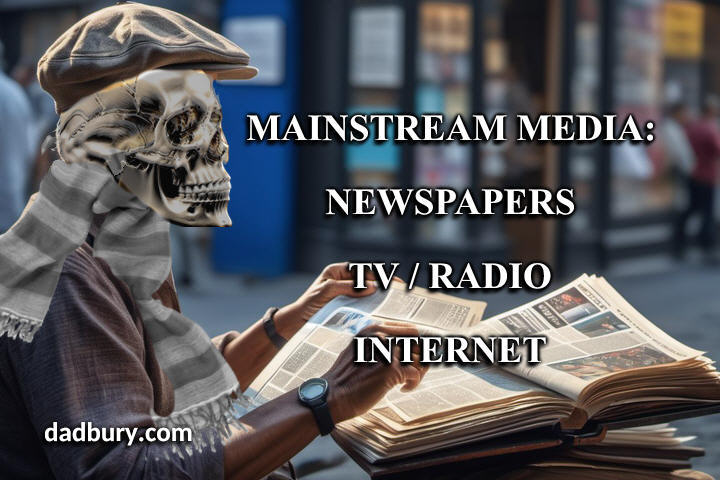
13th Lesson
"If you go back really not that long ago, as I say, we owned the news. We were the gatekeepers, and we very much owned the facts as well." And: "If it said it in the
Wall Street Journal, the New York Times, then that was a fact.” - Emma Tucker, editor-in-chief of The Wall Street Journal, January 18th, 2024.
The 'mainstream media'. Many like to pick up a newspaper sometimes. Turn on the TV, listen to the radio. Follow the news on the internet. But how reliable is the information they publish?
How certain can you be about what you see, read and hear? Mostly, reporters are not hamstrung and can report the truth. But there times when the truth is stretched, bent, and even dishonest.
"Never let the truth get in the way of a good story". - Commonly attributed to Mark Twain.
It depends upon the issues being discussed. Some people like to read of scandals. Perversely, that is 'entertainment' for them, and something they will gossip about to anyone who will listen.
But the biggest crime occurs in the arena of politics. Whatever is happening in this world, and if it is of importance to the establishment, then the facts can become twisted, distorted, and even
turned upside down. This is why the establishment likes news media. They can assert enough influence to ensure that only the narratives they approve of will be published. Of course, when the
real truth is known about some event, and the news media tells you the opposite, then they go into 'overdrive' and tell you that anyone who disagrees with them is either pushing misinformation,
or disinformation. They do not like it when they are found out for their lies, and they will vigorously attack anyone who threatens their version of events.
"The business of the journalists is to destroy the truth, to lie outright, to pervert, to vilify, to fawn at the feet of mammon, and to sell his country and his race for his daily bread."
- 'Labor's Untold Story', by Richard O. Boyer and Herbert M. Morais, published by United Electrical, Radio & Machine Workers of America, NY, 1955/1979.

14th Lesson
Angles, perceptions ... and the police.
Many years ago, I attended a number of presentations at my local college. Two of these concerned the subject of perception. The first focussed on one's angle of vision, something that can
assert a strong influence upon what one witnesses. The second concerned rational analysis.
The first presentation showed that by standing in two completely different places, but observing the same incident, you could draw two completely different conclusions as to what was really
happening. This emphasises the importance of always getting a second opinion, and not jump to conclusions because of what you alone have seen.
The second presentation concerned a story of someone who was accused of attempted robbery in a shop. A number of statements were made and we had to decide what could be proved, and what was
not reliable. This took place in three stages. First, the sudents had to decide alone if the alleged culprit was guilty. Then we were paired off and asked to reassess again our opinions. Finally,
we were put into groups of four. Each time I was dubious as to the claim that the man who seemed to be a thief, was in fact not guilty at all. As each stage of examination, and as each statement
was again considered, it became more obvious that the accused was innocent. Of all the statements considered, I seem to recall only one could not be determined. But we were told at the end of our
test that the accused WAS innocent of all charges.
Finally, we were told the same test was previously given to a group of senior police officers. But they all assumed the man was guilty. This is because the police tend to go by instinct, and
if they think someone is guilty in the first instance, they will not let go of that prejudice. Even when presented with the outcome, some still doubted the man's innocence. I have personally
seen this with some police officers I have known and encountered. They are stubborn to the point of destroying their own credibility by adopting such an attitude.

